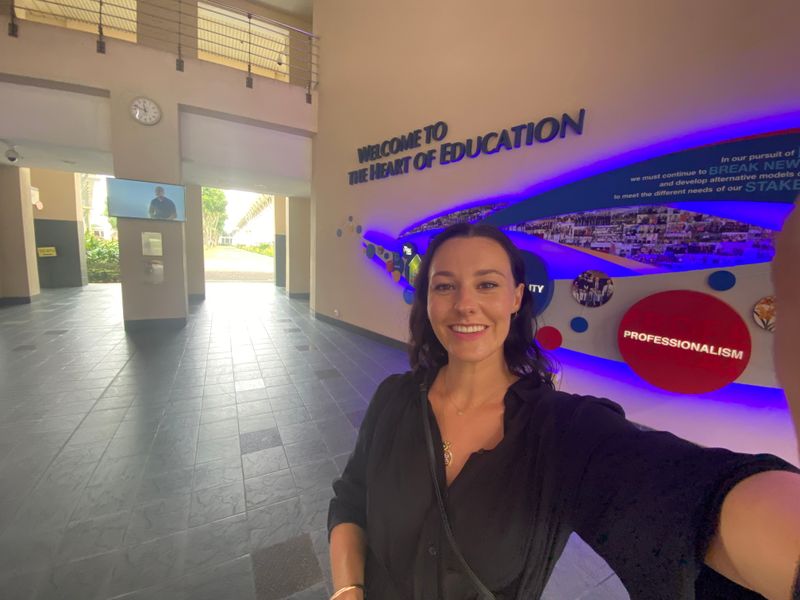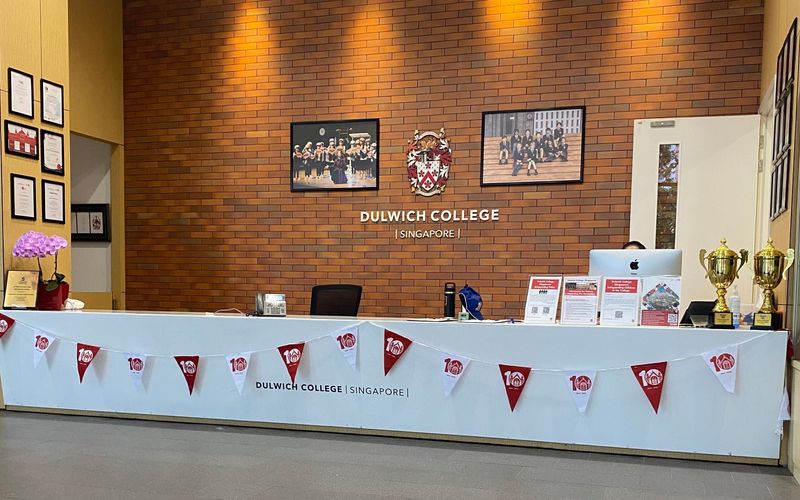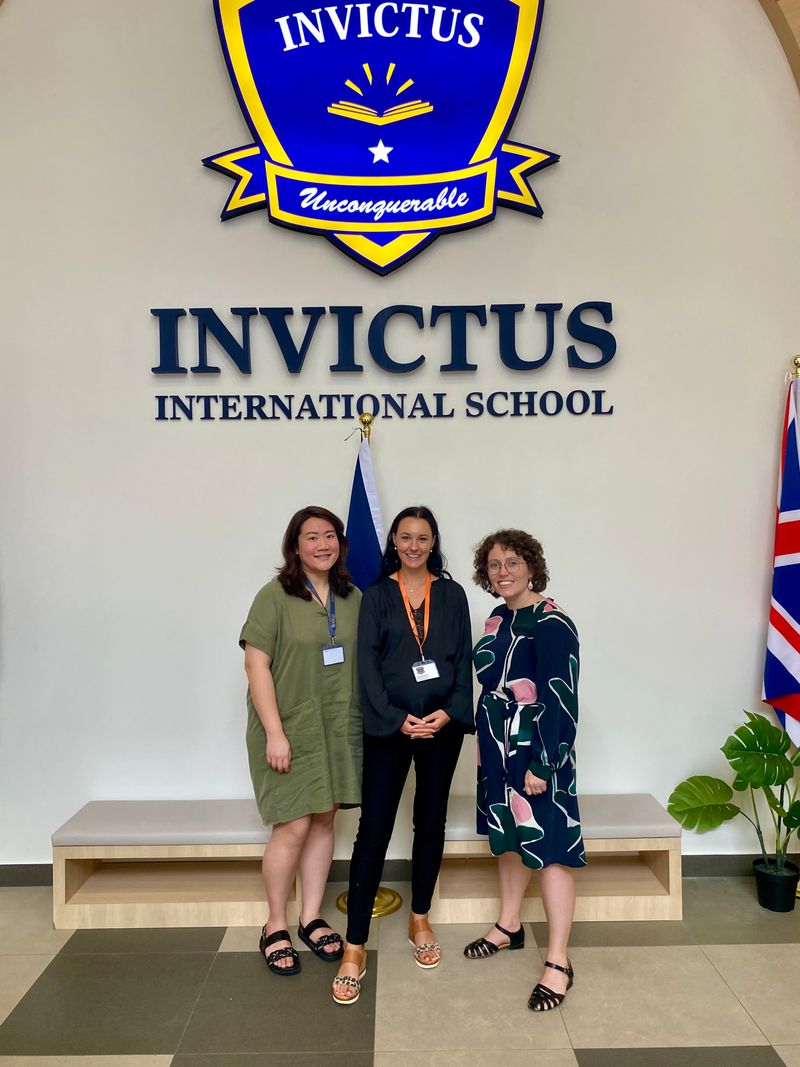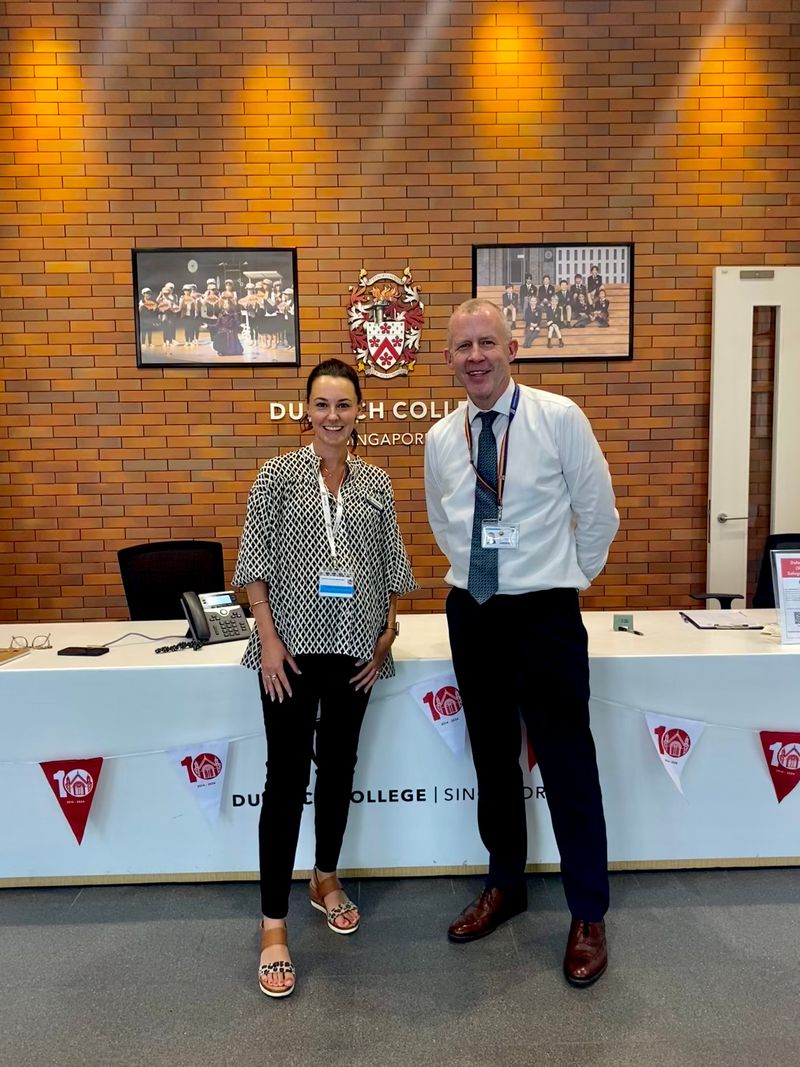
Enhancing Student Outcomes and Teacher Practice through Math Mastery: A Comprehensive Study Tour and Curriculum Framework Development.
As a primary school teacher with ten years of classroom experience, I’ve had the opportunity to teach across year levels from Prep to Year 3. Throughout my teaching journey, I’ve developed a strong passion for ensuring that every student feels a sense of success in the classroom and equally, that every teacher feels confident and equipped to deliver high-quality lessons. Over time, I’ve become increasingly interested in how we can bring greater consistency and clarity to the way we teach mathematics across the early years.

In 2024, I was fortunate to be awarded the inaugural Toowoomba Grammar School Teaching Fellowship to explore this interest more. My proposal, titled Enhancing Student Outcomes and Teacher Practice through Math Mastery: A Comprehensive Study Tour and Curriculum Framework Development, focused on investigating how the Math Mastery approach could strengthen both student understanding and teacher instruction in mathematics. This opportunity took me to Singapore to investigate the Math Mastery approach - an internationally recognised model of mathematics instruction that supports every student to achieve deep understanding through carefully sequenced, explicit teaching.

Why Mathematics? Why Now?
Across Australia, there is growing national concern about the long-term decline in mathematics achievement. Reports such as the Gonski Review (2018) highlight that many students are not mastering the basic skills needed for future learning, and that teachers need more explicit, structured tools to support all learners. In the early years of schooling—where concepts are first introduced, and mathematical mindsets are formed—it’s crucial that instruction is clear, consistent and effective. Gaps in understanding at this stage can have long-lasting effects on a child’s confidence and progress. The fellowship was an opportunity to examine international best practices and bring back evidence-informed strategies that could enhance both student outcomes and teacher practice in our own School.
Learning from Singapore: Schools and Insights
During my study tour in Singapore, I visited two leading international schools: Dulwich College and Invictus International School. Both schools use mastery-based approaches to mathematics, with structured, well-sequenced programs designed to develop deep conceptual understanding. At Dulwich College I observed math lessons from Years 1 to 5 that emphasised both mastery and practical application. The classrooms fostered a calm, focused learning environment in which teachers guided students through new concepts using clear, structured instruction, ensuring mastery through modelling, guided practice and checking for understanding before progressing. I also engaged in discussions with the school’s mathematics leadership team, who shared their planning processes and how they support teachers to differentiate within whole-class teaching.

Invictus International School offered a contrasting yet equally valuable perspective. With a diverse cohort of learners and a flexible curriculum model, their team demonstrated how mastery principles can be embedded in a range of contexts. I also had the opportunity to meet with local educational consultants and curriculum developers, who offered insights into how Singapore’s national curriculum supports cumulative learning, daily review and concept mastery from the early years onwards.

Key Findings: What Makes Mastery Work?
My observations confirmed the power of structured, explicit teaching in building strong foundations in mathematics. These were the key elements that stood out across all settings:
- Clear Learning Objectives
Teachers clearly define what students need to know and be able to do at the end of each unit or lesson.
- Whole-Class Instruction with Embedded Differentiation
Rather than streaming students by ability, mastery classrooms taught concepts to the whole class while using questioning, scaffolding and targeted support to meet individual needs.
- Corrective Instruction
Students who don't achieve mastery receive additional instruction or support to address knowledge gaps.
- Cumulative, Carefully Sequenced Learning
Each lesson built directly on the last, with time allocated for review and consolidation. This ensured that no student was left behind and that concepts were truly understood before new material was introduced.
- Mathematical Language and Reasoning
Teachers modelled precise vocabulary and encouraged students to explain their thinking. This supported deeper reasoning and helped students internalise core concepts.
- Learning Routines
Clear instructional routines and behaviours are established in every classroom, reinforcing expectations and supporting learning.
- Lesson Resources
Hands-on materials and visual examples are carefully chosen to help students connect with new concepts in ways that suit their learning needs.
- Fluency
Essential number facts are practised until automatic, helping students reduce cognitive load, enhancing students’ ability to focus on new and more complex ideas.
- Calm, Confident Learners
Most powerfully, students appeared confident, focused and proud of their mathematical thinking. The clear structure and shared learning journey contributed to a positive and inclusive classroom culture.

Global Perspective: Insights from Kinder World School
As a part of my research, I was able to engage in a conversation with Peter Baker, Principal Supervisor of 13 KinderWorld International Schools across Vietnam, I was able to dive deeper into how the Math Mastery approach works in large, diverse educational settings. These schools have adopted the Singapore Math model, a mastery-based framework built around explicit teaching and cumulative learning - many of the same principles I explored during my study tour.
Peter shared that their decision to adopt this approach was driven by a need for a consistent, evidence-based program that teachers could pick up quickly, deliver confidently and implement cost-effectively. “We started the explicit teaching model a couple of years back,” he explained. “We call it the KinderWorld Model. Retrieval practice to strengthen knowledge and problem-based application of learning is also included. I think it certainly makes a difference.”
What stood out to me in our discussion was just how closely their journey mirrors our own at TGS. We have already embedded strong practices in literacy through well-structured, whole-school programs that align with explicit teaching and the science of learning. However, mathematics remains an area where we see room for greater consistency and greater gains.
While our data confirms that we continue to perform above the state average in mathematics, recent NAPLAN results highlight a national decline in numeracy - a trend that we are aiming to avoid in our own School’s results. While we continue to do well, we have an opportunity and a responsibility to do even better for our boys. This is not just a local issue. In 2015, the Office of the Chief Scientist collaborated with ACARA to examine schools across Australia that had made significant improvements in numeracy over two years. Their report found that mastery-oriented environments were a consistent feature in high-performing schools (Smith et al., 2028).
When I asked Peter how the performance of his students compared to their peers in Australia, his response was compelling:
“We’ve had feedback from parents - many of whom are teachers - saying that when their children return to Australia, they are at least one to two years ahead in mathematics compared to their peers at home.”
This reinforces what global research has been saying for some time: structured, explicit, mastery-based teaching works. And more importantly, it works for all learners - not just the confident few.

Bringing It Home: What’s Next for TGS?
I’m incredibly grateful for the opportunity this fellowship has provided - not only in shaping and deepening my own practice, but in contributing to a broader, shared vision for mathematics at TGS. This experience reinforced my belief that every student can succeed in mathematics when we give them the right tools, time and teaching. We are now laying the foundations for a clear and united approach to numeracy, one that will equip every boy with the confidence and skills to succeed - not just in the classroom, but throughout their schooling and beyond. And just as importantly, we’re building a community of confident teachers who are equipped to deliver lessons that are clear, consistent and deeply impactful.
I would like to sincerely thank Dr John Kinniburgh for granting me the opportunity to undertake this Fellowship. His support and encouragement throughout the process has been instrumental, and I am truly grateful for his guidance and mentorship. Dr Kinniburgh’s commitment to prioritising high-quality professional development for staff continues to shape a culture of growth and excellence in teaching and learning at TGS.
Latest Blog
Gaining Ground with a Growth Mindset
I have seen the posters. I have sat the assemblies. I have watched the ads telling us about growth mindsets and how to develop one, and I'm sure you have too. But what we don't do is apply it to ourselves to help benefit our lives, however, there is no reason to blame yourself. The growth mindset is a deep topic that has many layers to it and is extremely important to have today. While we might blame other things on our weaknesses, it all links back to one thing – our mindset. To benefit our…
Sleeping Away the Mental Health Crisis
Two in five. That’s how many young Australians between the ages of 16 and 24 have experienced a mental disorder in the last 12 months (ABS, 2022). Let that sink in. Think of your closest five mates. Odds are that two of them are suffering right now from a crippling mental illness. According to recent studies conducted by the Australian Bureau of Statistics, Australia is witnessing an unprecedented rise in mental health issues among its youth, leaving them vulnerable and struggling (Headspace,…
Time for a Wake Up Call
Did you know that one in five 12–17-year-olds average over 8 hours of screen time a day? That means that in a 14-hour day, 57% of their waking hours involve looking at a screen! This madness is contributing to a very significant problem all teenagers face - sleep deprivation. It is killing us. We are becoming walking zombies rather than happy, growing lads. However, we can end this treacherous technological tyranny by putting down our screens before bed. Stop and think for a second. How much…
Breaking the Stigma
Strangling you in chains. Smothering you in despair. Anxiety and depression can be mighty beasts to break free from. Unfortunately, the state of traditional masculinity is reinforcing these chains. Mental health is a major threat to the well-being of men. This cage constructs barriers and borders which limit their ability to thrive in the modern world. Traditional Masculinity refers to a set of societal expectations foregrounded through the centuries by gender roles, stereotypes and beliefs.…
The Power of Gratitude
“What do you say mate?” your mum nudges you as the waitress hands you your dinosaur nuggets. “Thank you.” You have always been told to use good manners, and to say thank you, but what does thank you actually mean? Is it just two meaningless words uttered with monotonous regularity, or is it a tool that can alleviate mental health issues generating happiness and a sense of wellbeing? Gratitude is the sunlight that lights up those dark days. The ability to be grateful is at the core of personal…
The Silent Epidemic: Unveiling the Consequences of Sleep Deprivation
“Sleep that soothes away all our worries. Sleep that puts each day to rest. Sleep that relieves the weary laborer and heals hurt minds.” William Shakespeare (Macbeth, 1606) Heart Disease, Cancer, and Alzheimer's. Three life-threatening diseases. Three diseases all linked to lack of sleep. According to Dr. Okorie from the children’s health division of Stanford University, “7 out of 10 high school students are falling short of… (sleep) on school nights.” The Bulk of American teens are not getting…
Tik Tok - From Fun to Fear
Social media platforms have ingrained themselves into our daily lives in a time when technology is constantly evolving and drawing millions of users with seductive features and never-ending streams of captivating content. Among these, TikTok has become a worldwide phenomenon, captivating users with its viral challenges and short-form films. Underneath the fun and inventiveness however, there is growing concern about the risks connected to TikTok and other social media platforms. TikTok's…
Active Procrastination – Unlocking the Gates of Time
“Procrastination is like a credit card: it’s a lot of fun until you get the bill.” - Christopher Parker – professional actor. Unfortunately, procrastination is a term that we are all familiar with as students; the vast majority of us have experienced it firsthand. It saps our time and results like a parasite, a burden on its host. However, despite it’s reputation, recent studies have shown that when harnessed correctly, procrastination can be a powerful tool to improve both academic efficiency…
It Takes a Village...
The Toowoomba Grammar School Boarding community plays a pivotal role in shaping the young minds of our boarders and instilling values whilst creating a sense of mateship that can last a lifetime. The nurturing and supportive network of staff not only ensure a safe and structured environment but also cultivates a sense of belonging and camaraderie among the boys. ‘The staff supply the fuel to the ship but ultimately it is the boys who steer it and decide upon its final destination’. Our TGS…